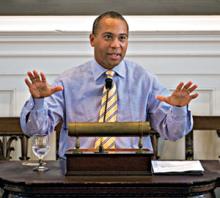By Emily Gold Boutilier
 Inside a crowded Johnson Chapel, Massachusetts Gov. Deval Patrick said he was fortunate to grow up in a neighborhood with a strong sense of community. "If you messed up down the street in front of Mrs. Jones's," he remembered, "she would, as we used to say, go upside your head as if you were hers and then call home. That was a community." |
Massachusetts Gov. Deval Patrick arrived at Johnson Chapel on the morning of Saturday, Sept. 8, to mark the launch of Amherst’s Center for Community Engagement. Designed to encourage a tradition of service at the college (see “Creating a culture of service,” College Row, Summer 2007), the new center, Patrick hopes, will accomplish something even bigger: “I’d like to see you defeat cynicism,” he said, addressing a full house in the chapel, “or at least take a big step in that direction.”
The governor, a Democrat, suggested that cynicism used to come only with age. “Now,” he said, “it’s pervasive among young people because they confuse it as sophistication and worldliness. And they’re wrong.” What’s so bad about cynicism? It “makes it very hard for people to believe that community is possible,” Patrick maintained.
The governor grew up on the South Side of Chicago, where, he said, despite gang violence and ill-equipped schools, the sense of community was strong. “Every child was under the jurisdiction of every single adult on the block,” he said. In 1970, Patrick arrived in Massachusetts to attend Milton Academy on a scholarship from A Better Chance (ABC), an organization that refers students of color to top public and private high schools to be considered for admission and financial aid. (A local chapter of the organization was founded by Amherst alumni, and a group of teens from the Amherst ABC House sat in the front row during Patrick’s speech.) Patrick became the first in his family to attend college. Eventually, President Bill Clinton appointed him assistant attorney general for civil rights.
In Johnson Chapel, the governor argued that community engagement is crucial to the nation’s health. He repeated a theme from his campaign, when he objected to tax rebates. “Some will say, ‘It’s your money,’” Patrick told the audience. “It’s also your broken roads. It’s your overcrowded schools. It’s your broken neighborhoods and your broken neighbor, too.”
The speech was part of a weekend-long celebration of the new Center for Community Engagement. Among the other events was a ribbon-cutting at Keefe Campus Center—the CCE’s new home—with remarks by President Anthony W. Marx, CCE Director Molly Mead and John Abele ’59. (Abele’s family philanthropy, the Argosy Foundation, has made a seven-year investment of $13 million to help establish the center.) Following Patrick’s talk, students, alumni, professors and community members took part in panel discussions on the topics of prisoner education, affordable housing, building healthy communities and improving access to college. The celebration also featured an all-night house-building party on land that the college has donated to Habitat for Humanity. The 24-hour construction project culminated in a wall-raising on the second of four houses to be built on the land.
Photo: Samuel Masinter '04